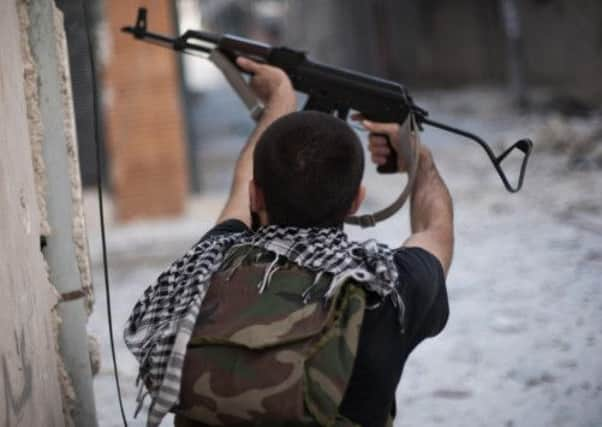Ted Bromund: Treaty binds hands of the good as evil thrives


Britain, I am sorry to say, is one of the leading lights of this treaty, which grew out of a speech by Foreign Secretary Jack Straw in 2005, when Labour was trying to compensate for the Iraq War. Since then, it’s become an article of faith on all sides of British politics. The idea behind the treaty is that too many nations apply no rules at all to their arms sales, and that common minimum international standards would save lives. It certainly sounds noble.
But the negotiations show all too clearly why it won’t work. At the UN, Syria – which has killed over 70,000 civilians over the past two years – has the same legal standing as Canada. The Iranian regime, which arms the Syrians, sits near democracies like Ireland. The prison camp state of North Korea speaks after the chilly, self-righteous, but very pleasant nation of Norway. You really have to be morally blind or deliberately naive to regard this as anything other than an embarrassment.
Advertisement
Hide AdAdvertisement
Hide AdIt’s not just the evil states of the world that are the problem. The incompetent ones, in their own way, are just as bad. Mali has suffered terribly from arms that have been smuggled across its borders. But the problem is not the absence of a treaty. The problem is that Mali is unable to govern its territory, or even to abolish slavery.
True, not every nation is as bad as Mali. But many places are uncomfortably similar to it. At the UN, you are in a bubble. Everyone wears a suit, English is spoken almost universally, the air conditioning works, and delegations carefully argue subtle points. But outside this bubble, the world often doesn’t work.
Many nations would argue, as indeed they have done over the past two weeks, that what they need to make the treaty work is more foreign aid. Nothing could be more wrong. If you give money to a creditable aid agency to provide emergency assistance, there is at least a chance that they will actually deliver it. But this is not about providing food to the hungry. It’s about the absence of the entire system of law and administration that we in the West take for granted.
What is really striking is that no nation at the UN will take any responsibility for the evils that they so freely condemn. And yet the systematic violations of UN Security Council arms embargoes do not just happen. They are the result, all too frequently, of deliberate acts of national policy.
Advertisement
Hide AdAdvertisement
Hide AdFor example, the UN itself released a report on the eastern region of the Democratic Republic of the Congo, which is plagued by armed groups. These groups are armed and supported by high-level officials, named by the UN, in Rwanda and Uganda. Yet both Rwanda and Uganda portray themselves as supporters of a strong Arms Trade Treaty, and no-one at the UN is discourteous enough to point out their hypocrisy.
The world certainly does want an ATT. But it doesn’t want it for the same reason. The holier-than-thou nations led by Norway appear to believe their own rhetoric and demand a supposedly perfect treaty. The dictatorships and autocracies, on the other hand, want the treaty for an entirely different reason. As speech after speech makes clear, they want a treaty that will prevent outsiders from arming “non-state actors”.
In other words, they want insurance against their own misrule. But it is not clear why the world would be a better place if people oppressed by dictatorships were deprived of any possibility of rebellion. Britain itself is edging towards arming the Syrian rebels.
Under the ATT, Iran would just keep on arming Syria, but Britain would be forbidden to respond. In a world where the bad do help the bad, the good should never adopt a self-denying ordnance.
Advertisement
Hide AdAdvertisement
Hide AdThe cry against “non-state actors” is not the only dangerous code word that is popular at the UN. The Arabs demand the treaty reject “alien and other forms of colonial domination”. which is an attack on Israel, the US, and India (because of Kashmir).
Venezuela and other crazy autocracies want “balanced and objective criteria” which means that they want nothing that will inconvenience human rights abusers. And the Africans, and others, condemn “discriminatory criteria,” meaning that the treaty should not refer, even obliquely, to their endemic corruption.
Most of these code words, thankfully, will not make it into the treaty. But their very popularity testifies to the fact that the code word users have no intention of abiding by anything they sign.
And when the subject is as serious as the international arms trade, taking the pretences of the UN seriously is nothing less than a moral disaster.